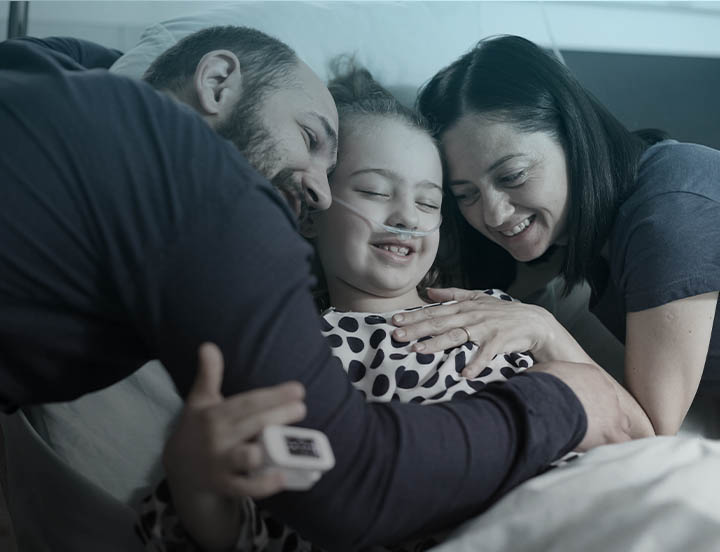For more than 100 years, the Royal Hospital for Children in Glasgow has been caring for families, babies, children, and young people from across Scotland and beyond. To ensure that young patients receive the extra special care they deserve at Scotland's largest children's hospital, Glasgow Children Hospital Charity (GCHC) fundraises tirelessly, with a £41 million investment since 2001.
BJSS and Sparck were delighted to support the charity’s 2023 fundraising campaign, Games for the Weans, and to help the charity and the NHS design a new gaming service.
The challenge: enable children to play video games in hospital
Online games are an almost universal pastime, with 89% of children in the UK playing video games (Ofcom, 2023). There is also growing evidence of the social, emotional and health benefits to gaming while in hospital (Ohsu, 2022).
The Glasgow Children hospital looks after 500 children and young people every day and has a dedicated Play Team that helps children cope by providing not just fun, but learning, listening, understanding procedures, and family support.
While the Play Team can play video games with young patients, there was no dedicated programme enabling children and young people to play video games while in hospital. The opportunities were sporadic and determined by the availability of a small number of consoles (in particular adapted consoles), the Play Team's schedule, the patient using a console or device of their own, and the difficulties of connecting to the WIFI.
Children in hospital need the opportunity to escape from the challenges they are facing. They want to live as normally as they would if they were home and to keep in touch with friends. Gaming provides a fantastic avenue to do this. As the Game Director of a global VR gaming studio said: "The joy of gaming is in the interactivity." Providing gaming resources, and someone to play with, could transform the hospital experiences of many children.
BJSS and Sparck delivered a fast innovation sprint to help Glasgow Children Hospital Charity design a new hospital gaming service - one that could be sustainable, scalable, could open new volunteering opportunities to deliver the service, and would be easily sharable with other children's hospitals.
The project: a fast research and innovative sprint
The BJSS, Sparck and GCHC team quickly established a strong partnership and together:
- Conducted research with 11 children, young people, families, and eight staff
- Ran an ideation and co-design workshop at GCHC HQ
- Created and tested a service prototype with patients and staff
- Delivered a high-level service blueprint, a map to evaluate effort vs impact, and next steps recommendations.
The on-site research highlighted that the hospital already had the assets and resources needed to deliver a service, including consoles and iPads, staff that were already acting as gaming champions, many patients who regularly gamed, strong support from staff and leadership, and solid evidence of the benefits. All that was needed was to build these existing elements into a coherent service that could meet the needs of patients and staff and that the hospital could continue to deliver in the future with the resources available.

However, there were fundamental barriers that needed to be addressed to deliver the service at scale, including the unreliability of WIFI access (many games require a strong, uninterrupted internet connection to play), as well as the storage and maintenance of the gaming equipment.
As this was relatively new territory for the GCHC and the NHS, the co-design pointed to the benefit of adopting an iterative approach to deliver impact quickly.
Co-designing with patients, families and staff also helped the organisations explore:
- the inequality of relying on personal devices (some patients would have their own consoles, but others would not),
- the unconscious exclusion of some demographics (for example, girls not seen as ‘gamers’),
- how needs vary across wards,
- how to include parents and carers,
- safeguarding, technical and space constraints.
The outputs: testing a new service before it even exists
To test the desirability of the service, the team produced a “Get Gaming” guide (pictured below): a prototype brochure that presented the gaming service as if it already existed. Built from the findings of the user research and ideation stages, the guide demonstrated how a fictionalised ‘gaming-as-a-service’ proposition could be incorporated into the patient journey and daily life in the hospital. The brochure contained an introduction, a list of events, how a patient would request, play, and return a game, the hospital staff to contact, and the list of partners supporting the programme.
The “Get Gaming” guide helped generate insightful feedback from users and staff, highlighting the greatest needs, wants and assets. More widely, it has shown how research can form a solid basis upon which to design a service, as well as how organisations can test a new service before writing a single line of code or committing significant investment.

The outcomes: onwards and upwards
In August 2023, the Glasgow Chamber of Commerce shortlisted the Games for the Weans campaign for the 2023 Glasgow Business Award for Excellence in Communications.
Whether you're a gamer, streamer, or just love to play games with friends and family, you can support Games for the Weans and help bring the power of gaming to children in hospital by donating, fundraising, or buying games in the Games for the Weans Steam Sale (7th-14th September 2023). Check out the GCHC website to find out more.

